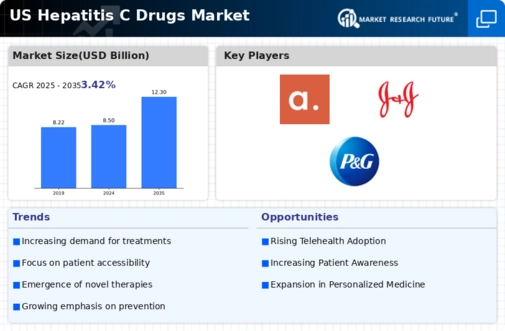Growing Awareness and Education
Growing awareness and education regarding hepatitis C are pivotal drivers for the hepatitis c-drugs market. Public health campaigns and educational initiatives have significantly improved knowledge about the disease, its transmission, and the importance of treatment. As more individuals become informed about hepatitis C, the likelihood of seeking testing and treatment increases. This heightened awareness is particularly crucial among high-risk groups, such as individuals with a history of intravenous drug use. The hepatitis c-drugs market is expected to expand as more patients are diagnosed and treated, driven by the ongoing efforts to educate the public about the disease and its management.
Advancements in Drug Development
Recent advancements in drug development have significantly impacted the hepatitis c-drugs market. The introduction of direct-acting antivirals (DAAs) has revolutionized treatment protocols, offering higher cure rates and shorter treatment durations. For instance, the cure rates for hepatitis C with DAAs can exceed 95%, which is a substantial improvement over previous therapies. This innovation has led to a shift in treatment paradigms, encouraging more patients to seek therapy. The hepatitis c-drugs market is expected to benefit from ongoing research and development efforts aimed at creating even more effective and tolerable treatment options. As pharmaceutical companies invest in new drug formulations, the market is likely to see a surge in novel therapies that cater to diverse patient needs.
Rising Prevalence of Hepatitis C
The increasing prevalence of hepatitis C in the US is a primary driver for the hepatitis c-drugs market. According to the Centers for Disease Control and Prevention (CDC), approximately 2.4 million individuals are living with chronic hepatitis C in the US. This growing patient population necessitates the development and availability of effective antiviral therapies. As awareness of hepatitis C rises, more individuals are seeking treatment, thereby expanding the market. The hepatitis c-drugs market is projected to grow as healthcare providers focus on treating this chronic condition, which can lead to severe liver complications if left untreated. The demand for innovative therapies that can cure hepatitis C is likely to increase, further propelling market growth.
Government Initiatives and Funding
Government initiatives and funding play a crucial role in shaping the hepatitis c-drugs market. Various federal and state programs aim to increase access to hepatitis C screening and treatment, particularly among high-risk populations. The US government has allocated substantial resources to combat hepatitis C, including funding for public health campaigns and treatment programs. For example, the Department of Health and Human Services has implemented strategies to reduce the burden of hepatitis C, which includes expanding access to antiviral medications. Such initiatives are likely to enhance the hepatitis c-drugs market by increasing patient enrollment in treatment programs and improving overall health outcomes for those affected by the disease.
Insurance Coverage and Reimbursement Policies
Insurance coverage and reimbursement policies are vital factors influencing the hepatitis c-drugs market. Many insurance providers have begun to cover the costs of hepatitis C treatments, which has made these therapies more accessible to patients. The expansion of Medicaid in several states has also contributed to increased access to antiviral medications. As reimbursement policies evolve to support the treatment of hepatitis C, more patients are likely to initiate therapy. This trend is expected to drive growth in the hepatitis c-drugs market, as financial barriers are reduced and treatment becomes more widely available to those in need.
















